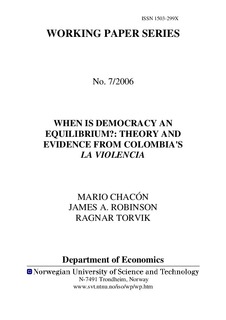| dc.contributor.author | Chacón, Mario | nb_NO |
| dc.contributor.author | Robinson, James A | nb_NO |
| dc.contributor.author | Torvik, Ragnar | nb_NO |
| dc.date.accessioned | 2014-12-19T14:31:42Z | |
| dc.date.available | 2014-12-19T14:31:42Z | |
| dc.date.created | 2006-09-29 | nb_NO |
| dc.date.issued | 2006 | nb_NO |
| dc.identifier | 126039 | nb_NO |
| dc.identifier.uri | http://hdl.handle.net/11250/267065 | |
| dc.description.abstract | The conventional wisdom in political science is that for a democracy to be consolidated, all groups must have a chance to attain power. If they do not then they will subvert democracy and choose to fight for power. In this paper we show that this wisdom is, if not totally incorrect, seriously incomplete. This is so because although the probability of winning an election increases with the size of a group, so does the probability of winning a fight. Thus in a situation where all groups have a high chance of winning an election, they may also have a high chance of winning a fight. Indeed, in a natural model, we show that democracy may never be consolidated in such a situation. Rather, democracy may only be stable when one group is dominant. We provide a test of a key aspect of our model using data from La Violencia, a political conflict in Colombia during the years 1946-1950 between the Liberal and Conservative parties. Consistent with our results, and contrary to the conventional wisdom, we show that fighting between the parties was more intense in municipalities where the support of the parties was more evenly balanced. | nb_NO |
| dc.language | eng | nb_NO |
| dc.publisher | Institutt for samfunnsøkonomi | nb_NO |
| dc.relation.ispartofseries | Working Paper Series, 1503-299X; 2006:7 | nb_NO |
| dc.title | When is Democracy an Equilibrium?: Evidence from Colombia's La Violencia | nb_NO |
| dc.type | Research report | nb_NO |
| dc.contributor.department | Norges teknisk-naturvitenskapelige universitet, Fakultet for samfunnsvitenskap og teknologiledelse, Institutt for samfunnsøkonomi | nb_NO |
